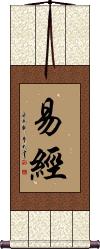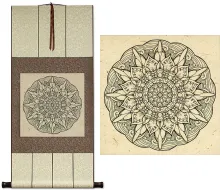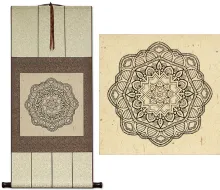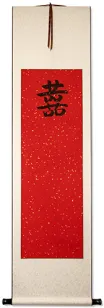Many custom options...
And formats...

The Book of Changes I Ching in Chinese / Japanese...
Buy a The Book of Changes I Ching calligraphy wall scroll here!
The Book of Changes / I Ching
This in-stock artwork might be what you are looking for, and ships right away...
Gallery Price: $60.00
Your Price: $36.88
Gallery Price: $90.00
Your Price: $49.88
Gallery Price: $90.00
Your Price: $49.88
Gallery Price: $90.00
Your Price: $49.88
Gallery Price: $200.00
Your Price: $111.88
Not the results for The Book of Changes I Ching that you were looking for?
Below are some entries from our dictionary that may match your The Book of Changes I Ching search...
| Characters If shown, 2nd row is Simp. Chinese |
Pronunciation Romanization |
Simple Dictionary Definition |
易經 易经 see styles |
yì jīng yi4 jing1 i ching |
More info & calligraphy: The Book of Changes / I Ching |
易 see styles |
yì yi4 i eki えき |
easy; amiable; to change; to exchange; prefix corresponding to the English adjective suffix "-able" or "-ible" (1) type of cleromancy divination (described in the Book of Changes) performed with long sticks; (2) (abbreviation) (See 易経) The Book of Changes; Yijing; I Ching; (given name) Yasushi Change; easy. |
周易 see styles |
zhōu yì zhou1 yi4 chou i shuueki / shueki しゅうえき |
another name for Book of Changes (I Ching) 易經|易经[Yi4 jing1] (See 易経) divination (based on the Book of Changes); (personal name) Shuueki |
易傳 易传 see styles |
yì zhuàn yi4 zhuan4 i chuan |
Yi Zhuan, commentary on the "Book of Changes" or "I Ching" 易經|易经[Yi4 jing1] |
易経 see styles |
ekikyou / ekikyo えききょう |
(See 五経) The Book of Changes; Yijing; I Ching |
六十四卦 see styles |
liù shí sì guà liu4 shi2 si4 gua4 liu shih ssu kua rokujuushike / rokujushike ろくじゅうしけ |
the 64 hexagrams of the Book of Changes (I Ching or Yi Jing) 易經|易经 the 64 hexagrams (of the Book of Changes) |
The following table may be helpful for those studying Chinese or Japanese...
| Title | Characters | Romaji (Romanized Japanese) | Various forms of Romanized Chinese | |
| The Book of Changes I Ching | 易經 易经 | yì jīng / yi4 jing1 / yi jing / yijing | i ching / iching | |
| In some entries above you will see that characters have different versions above and below a line. In these cases, the characters above the line are Traditional Chinese, while the ones below are Simplified Chinese. | ||||
Successful Chinese Character and Japanese Kanji calligraphy searches within the last few hours...










